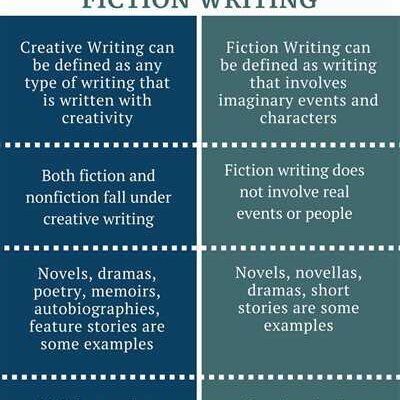
Writing fiction is a thrilling and immersive experience that takes you on a journey through your imagination. Furthermore, it allows you to explore the depths of your creativity and create unique worlds, fascinating characters, and compelling storylines. Whether you are a beginner learning the basic craft of writing or an experienced author looking to further develop your skills, this article will guide you on how to start writing fiction.
First and foremost, before you begin, it’s important to choose a topic or idea that you are passionate about. Whether it’s a specific character, an event, or a world you wish to explore, finding a topic that sparks your interest will make the writing process more enjoyable and engaging. By using your own experiences or drawing inspiration from various sources, you can create a story that is truly yours.
Once you have your idea in place, it’s time to start structuring your story. Begin by introducing your characters, their motivations, and the overall plot. This is where the tools of the trade come into play. By using techniques such as foreshadowing, clues, and specific events, you can create an engaging narrative that keeps your readers hooked.
As you write, it is crucial to establish a routine that works best for you. Some authors prefer to meticulously plan out their story using outlines and plot charts, while others prefer to let the story unfold organically. There is no right or wrong approach, so find what works best for you. Along the way, consider seeking feedback from a trusted friend, writing group, or even a professional tutor. Their input and guidance can help you improve your writing skills and refine your story.
Throughout the writing process, it’s important to remember that writing fiction is a craft that takes time to master. Be patient with yourself and be willing to revise and edit your work until you feel it’s the best it can be. Many national and online courses offer valuable resources and knowledge to help you further develop your skills as a writer.
In conclusion, writing fiction is a rewarding and fulfilling endeavor that allows you to create a world of your own. With the right tools and support, you can produce captivating stories that leave a lasting impact on readers. So, pick up your pen, dive into the world of fiction, and let your imagination soar!
Writing Fiction
Writing fiction is a craft that allows authors to create their own worlds and characters, while also exploring new ideas and storylines. Whether you are a beginner writer or an experienced author, there are many resources and tools available to help you develop your skills and improve your writing.
One of the leading ways to start writing fiction is to open yourself up to new experiences and learn from them. By exploring different topics and material, you can find inspiration for your own stories. Additionally, taking writing courses or working with a tutor can introduce you to the specific skills and techniques necessary for effective storytelling.
When you begin writing fiction, it’s important to know that there is no right or wrong way to approach the craft. Some writers are plotters, who prefer to outline their stories and plan events in advance. Others are pantsers, who like to start with a basic idea and let the story unfold as they write.
Regardless of your approach, structuring your story with a clear beginning, middle, and end is crucial. This helps to keep your readers engaged and gives your story a sense of direction. Furthermore, using strong and well-developed characters can bring your story to life and make it more relatable to readers.
While creativity is a key aspect of writing fiction, it’s also important to be consistent with your story’s internal logic. This means creating a world that follows its own rules and clues, so that readers can easily navigate through your story without feeling lost or confused.
As you dive deeper into your writing routine, it can be helpful to receive feedback from other writers or trusted readers. Their fresh perspectives can provide valuable insight into areas where your story may be weak or flat. Additionally, their feedback can help you refine your writing skills and improve the overall quality of your work.
One of the most important habits for fiction writers is to write regularly and consistently. This practice allows you to develop your writing muscles and produce more content. Without the habit of writing regularly, it can be difficult to make progress on your literary projects.
Finally, as you continue to write and explore the world of fiction, it’s important to remember that there are no specific rules or formulas for success. Every writer has their own unique style and approach to storytelling. Find what works best for you and embrace it.
Writing fiction can be a fulfilling and enriching experience. It allows you to express yourself, convey your thoughts and emotions, and connect with readers on a deep level. So, if you have the desire and passion for storytelling, don’t be afraid to begin your journey as a fiction writer.
Start with a topic you wish to explore
When it comes to writing fiction, one of the first things you need to do is choose a topic or theme that you wish to explore. This topic will serve as the backbone of your story and will help you shape the characters, events, and overall plot.
Choosing a topic to write about can be both exciting and challenging. On one hand, you have the freedom to explore any subject or idea that interests you. On the other hand, you may feel overwhelmed by the endless possibilities and unsure of where to begin.
If you’re a beginner writer, it’s recommended to start with a topic that you are passionate about or have some prior knowledge in. This will make the writing process easier and more enjoyable for you. For example, if you have a strong interest in history, you might choose to write a historical fiction novel.
Furthermore, choosing a specific topic can also help you structure your story. It gives you a foundation to build on and prevents your story from becoming too scattered or unfocused. When you have a clear topic in mind, it’s easier to develop strong characters, create meaningful events, and produce a cohesive storyline.
Once you have chosen your topic, it’s important to do some research and gather relevant material. This will help you add depth and authenticity to your story. You can read books, articles, or watch documentaries related to your chosen topic to gather clues and gain a better understanding of the subject matter.
Another important aspect to consider when choosing a topic is feedback and support. If you are taking writing courses or working with a tutor or writing group, you can receive valuable feedback and support to further enhance your skills and craft. By discussing your topic and sharing your ideas with others, you can receive different perspectives and new insights.
Overall, starting with a topic you wish to explore is the first step in the writing process. It gives you a clear focus and direction for your story, leading to stronger beginnings and a more structured workflow. So go ahead and choose a topic that inspires you and start writing!
Create a Leading Character

One of the most basic and essential aspects of writing fiction is to create a strong and compelling character. A well-developed leading character can make or break a story, as they are the driving force behind the events and the reader’s overall experience. Without a strong leading character, the story may feel flat and lack the necessary emotional depth to engage the reader.
When creating a leading character, it is important to know who they are, what they want, and what makes them unique. Begin by exploring their backstory, their motivations, and their personality traits. This will provide you with the material you need to develop a well-rounded and believable character.
There are several tools and techniques you can use to support you in this process. One popular method is the use of character questionnaires, which provide a series of prompts to help you think through the various aspects of your character’s life. By using these tools, you can uncover hidden details and gain a deeper understanding of who your character is.
Another important aspect of creating a leading character is to give them a strong goal or desire. This will drive the plot forward and provide a clear focus for the story. Without a strong goal, the story may lack direction and purpose, leaving the reader feeling unengaged.
As you begin to write your story, keep in mind that your leading character will evolve over time. As the events of the story unfold, they will face challenges and obstacles that will shape them and change them. It’s important to allow your character to develop organically and to let their experiences inform their actions and decisions.
Receiving feedback from others is also an important part of the writing process. Sharing your work with friends, writing groups, or online communities can provide valuable insights and help you identify areas for improvement. Additionally, seeking out resources like books, courses, and workshops on the craft of fiction writing can provide you with valuable tools and support.
Ultimately, creating a leading character is a key step in producing a compelling and engaging story. By structuring your character’s arc and giving them strong motivations, you can craft a story that will captivate readers and leave a lasting impact.
How to Write Fiction Beginner
Writing fiction is an open and exciting world that allows you to explore your creativity and create characters and storylines that you’ve always wished to see. If you’re a beginner writer, it’s important to know how to start and develop your writing skills in order to produce strong and engaging fiction.
One of the most important things in writing fiction is to begin with a basic idea or topic for your story. Whether it’s a plot, a character, or a specific event, choose something that excites you and makes you want to write more. From there, you can start structuring your story and creating the overall framework.
As a beginner, it’s helpful to learn from more experienced authors and take courses or assignments that support your learning. There are many online courses and resources available that can further your understanding of the craft and provide you with tools and feedback to improve your work. Additionally, finding a writing tutor or joining a writing group can be extremely helpful in receiving feedback and guidance on your work.
While there is no specific workflow that works for every writer, it’s important to develop a routine and habit for your writing. Some writers like to outline their stories and plan out the plot and characters in detail, while others prefer to dive in without much planning. It’s up to you to find what works best for your writing style and creativity.
When it comes to creating characters, it’s important to make them feel like real figures with their own motivations and personalities. Give your characters depth and complexity, and introduce clues and details throughout the story that reveal more about who they are. This will help readers connect with your characters on a deeper level.
Another important aspect of writing fiction is creating a strong beginning. The first few pages are crucial in capturing your reader’s attention and setting the tone for the rest of the story. Introduce the main conflict or problem right from the start and hook your reader with interesting and engaging writing.
Furthermore, don’t be afraid to make mistakes or write without knowing where your story is going. The editing process is there to help you refine and polish your work. Sometimes the best ideas come from unexpected places, so allow yourself to explore different directions and let your creativity guide you.
In conclusion, writing fiction as a beginner can be a challenging but rewarding experience. By learning from other authors, developing a routine, and embracing the creative process, you will be able to produce engaging and compelling fiction that captivates your readers.
| Writing Tips for Fiction Beginners: |
|---|
| – Begin with a basic idea or topic that excites you |
| – Learn from more experienced authors and take writing courses |
| – Find a writing tutor or join a writing group for feedback and guidance |
| – Develop a routine and habit for your writing |
| – Create complex and relatable characters with their own motivations |
| – Hook your readers with a strong beginning |
| – Embrace the editing process and don’t be afraid to make mistakes |
| – Allow your creativity to guide you and explore different directions |
Sources
When it comes to writing fiction, there are many leading sources that can help you develop your skills and creativity. Whether you are a beginner or an experienced writer, these sources can provide valuable tools and support to enhance your craft.
If you wish to learn more about the basic elements of fiction writing, you can start by using online courses or attending writing workshops. These courses can introduce you to topics such as character creation, structuring your story, and how to write strong dialogue.
One option is to receive guidance from a tutor who can provide personalized assignments and feedback on your work. This can be especially helpful for beginner writers who may feel overwhelmed without specific guidance.
Furthermore, reading fiction books and analyzing the work of successful authors is another way to improve your writing skills. By examining the beginnings, characters, and events in these works, you can learn valuable techniques for creating engaging stories.
It is also important to develop a routine and workflow that works for you. Some writers find that they are more productive when they have a set writing time, while others prefer to write whenever inspiration strikes. Regardless of your preferred routine, setting aside dedicated time for writing can help you make progress on your work.
In addition to these sources, it’s essential to explore your own experiences and ideas. Your own thoughts and perspectives can serve as unique material for your fiction. By using your own experiences as a starting point, you can create more realistic characters and a more immersive world for your readers.
Overall, the key to writing fiction lies in a combination of learning from others and using your own creativity. By utilizing the tools and support available to you, you can produce work that is both enjoyable and engaging.










